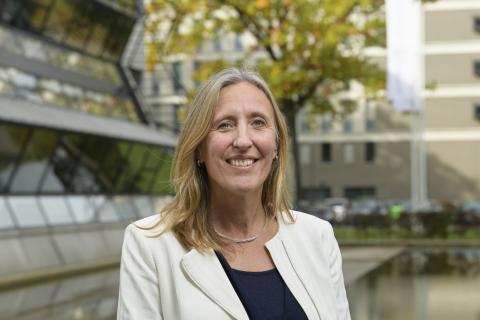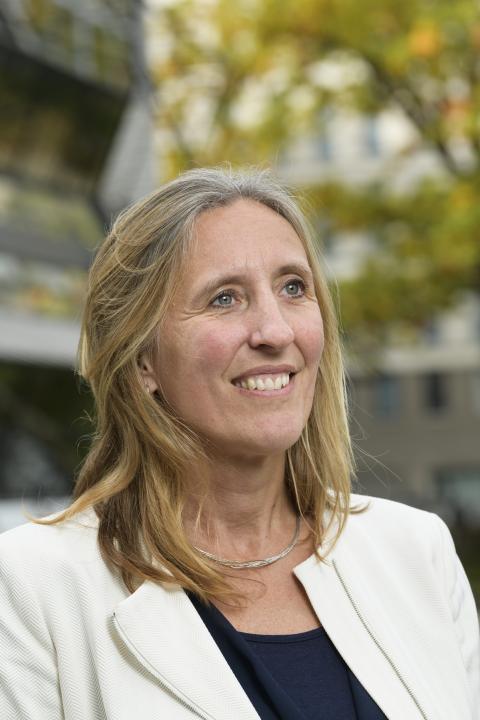In 2030, working on your own mental health will be the most natural thing in the world
Mental health is just as important for you wellbeing as physical health. That may be stating the obvious but, as a rule, few people are open about psychological issues. Digitalization can play a role in breaking the taboo, says Professor of Innovation in Mental Healthcare Inge Bongers. “Lots of new, online forms of self-help and other therapies are becoming available. This technology makes it easier for people to talk about psychological vulnerabilities and will increase people’s individual control of their mental health and wellbeing.”
“One in four people sooner or later experiences a period of psychological vulnerability. If it does not happen to you, then it will affect someone close to you. It may involve burn-out, stress, depression, or anxiety,” says Inge Bongers. Besides her work as a researcher at Tilburg University, she has worked at GGZ Eindhoven as a Research program manager for years so she is familiar with the daily practice of mental healthcare.

One in four people sooner or later experiences a period of psychological vulnerability. If it does not happen to you, then it will affect someone close to you
Professor of Innovation in Mental Healthcare Inge Bongers
More self-help
“Despite recent attention for the subject, the stigma of psychological symptoms continues to exist. This forms a barrier to discussing the subject and to seeking help. You will sooner go to your GP with a belly ache than for symptoms of depression. This is a great pity, because it can have an enormous impact on yourself, your nearest and dearest, and your work or studies. Fortunately, in most cases the symptoms are temporary and professional help is not always necessary. Still, waiting lists are long and pressure on mental health staff is sky high. More self-help is therefore a logical and necessary development, that is made possible in part by new online technologies and eHealth applications. I hope that, by 2030, working on your own mental health will be the most natural thing in the world.”
Given the growing waiting lists and staff shortages, the pressure on mental healthcare is sky high. More self-help is a logical and necessary development
Human contact
There are apps for mindfulness, yoga, and nudging users to take a walk, online treatment teams and online psychologists, smart watches that measure stress levels, and so on and so on. Will we be going totally online in the future? Inge Bongers is enthusiastic on the benefits of digitalization but warns that it should not be an end in itself. And certainly cannot replace human contact. “To many people, it can be a godsend. It is a very convenient way of integrating help and therapy into day-to-day life, lowering the threshold to accept help. It will also help sustain our care system and take the pressure off the staff shortages. However, it must not lead to a situation in which people are left to fend for themselves.”
For many people, online care can be a godsend. It is a very convenient way of integrating help and therapy into day-to-day life, lowering the threshold to accept help
“Too often, an unqualified plea is made to offer more eHealth opportunities. But not every app is suitable for everyone at any moment. Science plays an important role in looking critically at all these aspects in developing, testing, and implementing eHealth applications.”
Transformation in care
Just as video calls have become commonplace at the office, eHealth will become part of the standard healthcare services. “Care as usual,” says Inge Bongers. “Before we can realize this, we all need to develop a totally different mindset, in which online resources are an inseparable part of prevention, support, and care. This is the biggest transformation that we need to address. It will require a lot from people. An example from the context of nursing homes is the smart diaper. At a certain level of saturation, a notification is sent to an app. This allows carers to change patients’ diapers when it is necessary, rather than when the next diaper change has been scheduled. This system has many benefits, but it requires abandoning the regular changing schedule. And it requires certain online application skills. Perhaps the organization should offer training in this system. Are people open to trying it out? Is the employer prepared to invest? After all, you need to spend money to make money.”

The greatest transformation in healthcare will be to develop a mindset, together with all stakeholders, in which online resources are an inseparable part of prevention, support, and care services
Joining forces
“Tilburg University can help get the complex transition to online healthcare off the ground in a warm and dignified way with sound fundamental and mission-driven research. It will require multidisciplinary collaboration: we will need every type of expertise available within our university. Tranzo’s researchers (TSB) are very good at what we refer to as Human Centered Design: research in co-creation with patients and caregivers, leading to solutions that resonate with and are better tailored to the patient’s needs and the professional’s practice. For the Artificial Intelligence technicalities and the expertise in communication and language, you need the scholars of TSHD. The legal and ethical issues need to be addressed by TLS. Organization scientists are essential for dealing with the changing work processes. And TiSEM’s economist are well-placed to address issues of affordability and funding. Fortunately, it is incredible fun to do this together with colleagues from the other Schools. We will join forces in the university-wide Academic Collaborative Center ‘Digital Health and Mental Wellbeing’.”
To get the transition to online healthcare off the ground in a warm and dignified way, we will need every type of expertise available within our university
Prevention
The collaboration is already paying off, says Inge. “We have plans to develop a relapse prevention tool for people with a serious psychological condition. This tool draws the client’s attention to certain triggers, so that they become more aware of them. Together with the caregiver, a client can act on these signals to prevent a relapse or a crisis. Another great example is ‘eHealth junior’, a large project, funded by the Dutch National Research Agenda (NWA), that we are carrying out in partnership with the Erasmus MC, Erasmus University Rotterdam, and the UMC Utrecht, among other institutions. The objective is to develop, evaluate, and implement apps, to help children with chronic physical conditions and their caregivers (e.g., pediatricians) prevent psychological problems. Through games and challenges, we want to make it just a little bit easier for these children to connect with their peers. So it will be just a little bit easier for them to participate in the activities a child normally will want to engage in. This will increase the wellbeing of these children and their parents, and make a real difference for a vulnerable group. That impact is what makes me tick, that I can contribute to wellbeing with my research. It makes me glow all over.”
With the eHealth Junior project, we are really making a difference for children with chronic physical conditions and their parents
More information
Inge Bongers is Professor of Evidence-Based Management of Innovation in Healthcare at the Department of Tranzo, Tilburg School of Social and Behavioral Sciences (TSB), and program manager of the Academic Collaborative Center of Technological and Social Innovation for Mental Health. In addition, she has worked many years at GGZ Eindhoven, at the moment as a program manager of the research group of Evidence-Based Management of Innovation (EBMI), coordinating practice-oriented research aimed at developing, implementing and upscaling innovations in the area of health and wellbeing. Together with Professor of Communication and Cognition Emiel Krahmer, she is the driving force behind the university-wide Academic Collaborative Center of Online Health and Mental Wellbeing that is being established. Inge Bongers is also the contact at TAISIG for AI applications and concepts.
